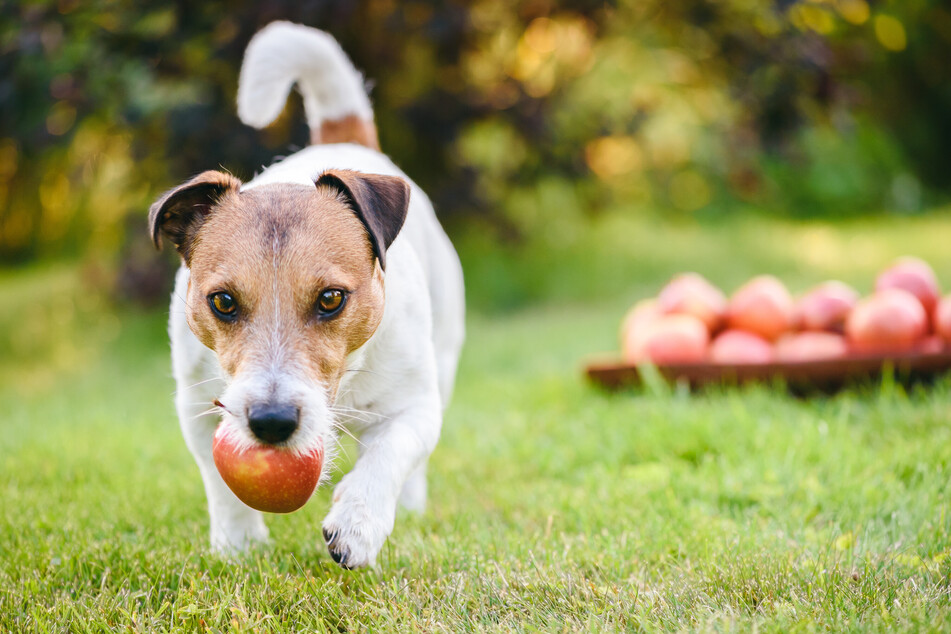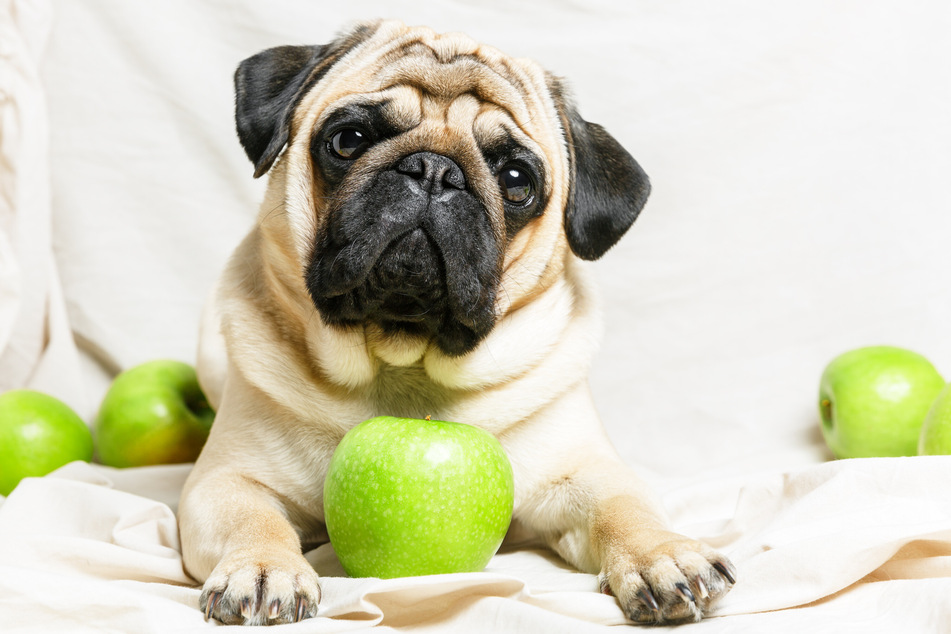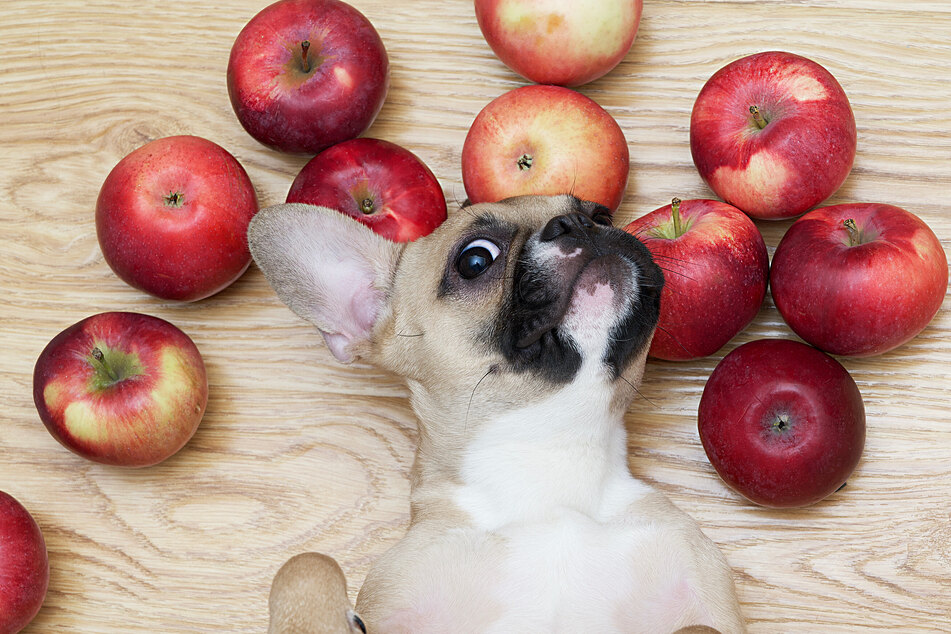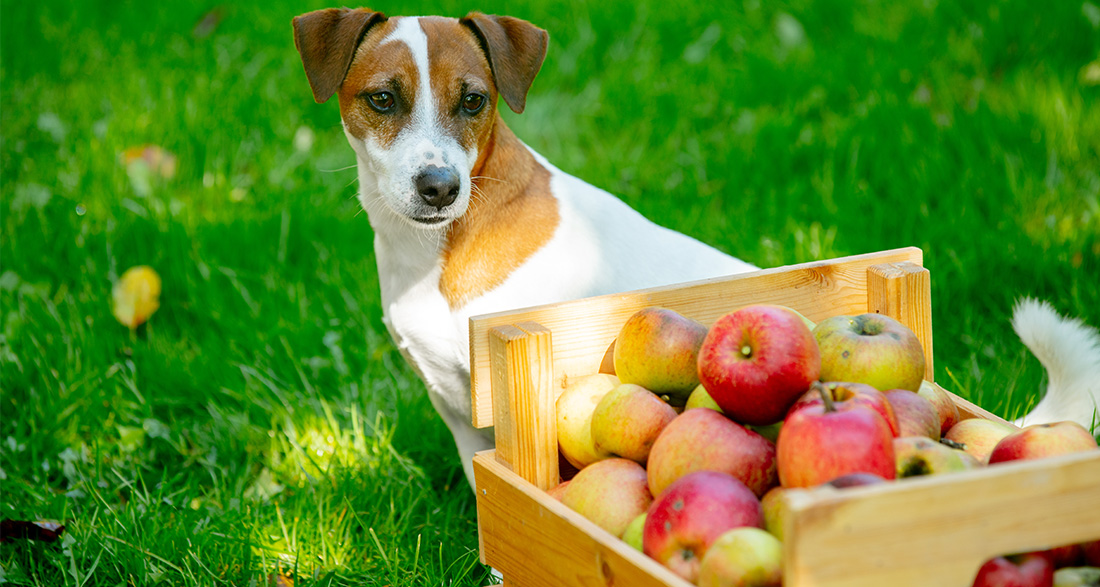Full of vitamins and delicious to boot: Can dogs eat apples? Or is this sweet fruit even dangerous for our four-legged friends?
Every dog owner is familiar with it: food envy. As soon as you’ve got something tasty to eat, Fido is already standing there with a begging look. But which foods are edible for dogs, and which ones can be dangerous?
While treats like chocolate can lead to life-threatening poisoning in dogs, many fruits and vegetables are well-tolerated and even beneficial for a dog’s health.
In this post, we focus on apples: Can dogs eat apples? iHugDogs investigates this question.
Quick Facts:
- Dogs can eat apples, even with the skin.
- Apple consumption can be beneficial for puppies and sick dogs.
- Overfeeding dogs with apples may pose a risk of gastrointestinal problems.
- Dogs must not eat apple seeds or the stem.
Can Dogs Eat Apples? A Clear Answer
Yes, dogs can eat apples. However, as with all fruits and vegetables, this should be done in moderation.
For those who want to feed their dogs apples, there are some important considerations. The following provides answers to key questions.
Why Are Apples Healthy for Dogs?
Apples are not only healthy for humans but also for dogs. The vitamins and nutrients in the fruit strengthen the immune system, protecting against diseases.
Due to the high water content, sodium, and potassium in apples, they also regulate a dog’s water balance and provide hydration on hot days.
The following vitamins and nutrients are found in apples:
- Vitamin A
- B-vitamins (especially B1, B2, and B6)
- Vitamin C
- Vitamin E
- Vitamin K
- Zinc
- Iron
- Potassium
- Sodium
- Calcium
Can Dogs Eat Apples with Skin? Yes, absolutely! The skin contains the most vitamins and nutrients.

How Many Apples Can My Dog Eat?
Dogs should only eat ripe fruits. Therefore, especially with apples from the home garden, ensure that the fruit is not already rotting.
Whether fresh from the tree or from the supermarket, apples are the perfect snack. The amount in the food bowl depends on the dog’s diet and weight.
Ideally, dogs should have about 18% fruits and vegetables on their daily menu. However, this requirement is already met with conventional wet and dry dog food. This recommendation is more aligned with a BARF (Biologically Appropriate Raw Food) diet. For a 15-kilogram dog, approximately 1/4 of an apple per day is recommended in this case.
As a guideline, small portions of apple can be added to a dog’s daily or weekly menu.
Caution
Apples contain a lot of fructose. Therefore, dogs with chronic conditions such as diabetes should avoid fruit or seek advice from a veterinarian.
Can Puppies Eat Apples?
The answer to this question is also a clear “Yes.” Puppies, in particular, benefit from the calcium content of apples, which strengthens their bones and contributes to healthy growth.
For puppies, apple pieces should be cut into small chunks or, ideally, grated. Also, the quantity should be adjusted to the puppy’s low weight.

Pros and Cons of Apples for Dogs
Apples have positive effects on a dog’s health. However, overfeeding can lead to symptoms of illness. The iHugDogs guide has compiled all the pros and cons of this sweet fruit.
What Do Apples Do for Dogs?
“An apple a day keeps the doctor away” is a well-known English proverb.
Indeed, the vitamins and nutrients in apples contribute to a healthy immune system:
- Vitamin A promotes healthy skin and eyes.
- The B-vitamins protect the dog’s nervous system and are especially helpful for excitable dogs.
- Additionally, the vitamins and nutrients in apples can protect against cancer and diabetes.
The domestic superfood is a real power booster for dogs as well.
Apples Help Dogs with Gastrointestinal Issues
Apples are not only helpful for a dog’s immune system and organs but also aid in gastrointestinal issues such as diarrhea, constipation, or bloating.
The pectin in apples binds water in the intestines. The fibers swell, soothing the stomach and intestinal lining. Therefore, apples are a natural remedy for dogs with both diarrhea and constipation. But how should the fruit be fed?
- For diarrhea: Mix grated apple into the food or give it separately.
- For constipation: Feed cooked apples without the skin.
Good to Know: Apples can be a helpful home remedy for a dog’s constipation or diarrhea. However, if the symptoms do not improve within 2-3 days, a veterinarian should be consulted.

If the Dog Has Eaten Too Many Apples
Has your dog developed a taste for apples? Even so, you should only give him this sweet fruit in small quantities to avoid undesirable side effects. While apples are helpful for gastrointestinal problems, an overdose can also cause issues.
The following symptoms indicate an overfeeding of apples:
- Heartburn
- Stomach pain
- Diarrhea
- Vomiting
- Bloating
In rare cases, apples in dogs can lead to allergic reactions such as itching or difficulty breathing. Therefore, introduce the fruit to the dog cautiously at first and test its tolerance.
Can Dogs Eat Apples? Yes, but…
In addition to the health benefits, dog owners should always remove the core and stem of the apple before feeding it to their pets. The stem can be easily swallowed or get stuck in the dog’s throat.
Apple seeds, in the worst case, contain cyanide and can lead to the following poisoning symptoms:
- Increased respiratory rate
- Excessive salivation
- Dilated pupils
- Low blood pressure
In cases of dog poisoning, every minute counts!
If there is a suspicion that the dog has swallowed apple seeds, waste no time and immediately consult a veterinarian or an animal clinic.
Conclusion: The Right Parts of Apples Are Great for Dogs
Dogs can eat apples. This healthy fruit helps with various health issues and is well-tolerated in small amounts.
However, it’s crucial not to overdo it to avoid accidentally harming the dog. It is also important to remove the stem and seeds from apples before feeding them to the dog.


